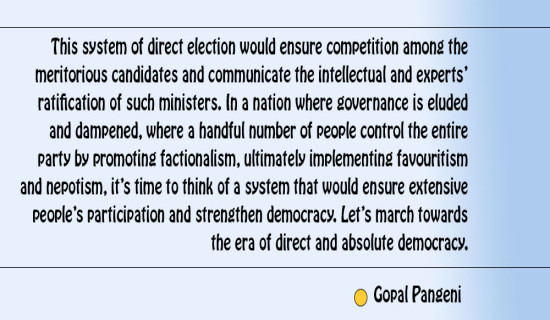- Saturday, 25 October 2025
Improve Hospital Governance
Media reports often bring to fore the news shedding light on growing dissatisfaction and disenchantment of the ordinary citizens towards services delivered at hospitals both from public and private sector. The civic discontents and frustration on the medical care and hospital services oftentimes burst into violent conflicts resulting into manhandling of the physicians and nursing staff to wanton destruction of hospitals assets, logistics and equipment. Almost a year ago, the relatives of a 22-year-old woman who died after a caesarean section in a community hospital in Dhulikhel vandalised the hospital and assaulted healthcare professionals, including doctors on duty. The woman’s husband and mob that had gathered at the hospital had accused that the negligence on the part of doctors was responsible for the death of the patient.
Likewise, in yet another incident that had occurred not very long back, a doctor was manhandled abusively following the death of a patient at a well-known hospital in the capital city. Relatives of the deceased alleged that negligence from the doctor was the sole cause for the death. Aforementioned are just representative cases of assaults, manhandling and violence against doctors and attack on healthcare facilities. Nepal Medical Association, an umbrella organisation of medical doctors, in its report says that every month about a dozen of incidents of similar nature take place in the country. As the frequency of such incidents rises, Nepal Medical Council, the regulating body, has cautioned doctors to fulfill all minimum standards for patients care and safety.
Violent attacks
In fact, the cases of attacks on doctors, nurses and hospitals need to be objectively looked into and their causes need to be ascertained. Then only the issues that give rise to them can be addressed in an effective manner. Oftentimes, such incidents are portrayed and depicted as criminal offences as if they were premeditated and carried out wantonly on behalf of the patients for some mischievous ends. However, such untoward incidents that occur in hospitals need to be looked from patients' rights perspectives too. In some cases, it is found that denial and derogation of the globally endorsed and nationally sanctioned rights of the patients can be said to be responsible for occurrence of such violent attacks on doctors and hospitals.
UN covenants and World Health Organisation (WHO) guidelines stipulate the rights of individuals for quality healthcare and obligation of the hospitals and healthcare institutions to deliver services in an effective and humane manner. The World Medical Assembly has spelt out clearly about the relationship between physicians, their patients and broader society stating “while a physician should always act according to his/her conscience, and always in the best interests of the patient, equal effort must be made to guarantee patient autonomy and justice.” This article summarises some of the rights of the patients which need to be promoted and respected to minimise violent incidents stalking hospitals in the country.
A patient has the right to get appropriate medical care, intervention and treatment. In the course of such treatment, his or her human dignity, convictions, integrity, individual needs and culture should be respected. Patients in emergency need are entitled to receive immediate medical care and treatment without any deposit, pledge, mortgage or any form of advance payment for treatment. However, it is sad to note that the hospitals in Nepal have not been found respecting this right of the patient.
In the same way, the patient has a right to a clear, truthful and substantial explanation, in a manner and language understandable to him or her. A patient needs to be informed of all proposed diagnostic, preventive, curative, rehabilitative or therapeutic procedures. And the person who performs the said procedure is under an obligation to provide his name and credentials to the patient including possibilities of any risks or serious side effects, problems related to recuperation, and probability of success and reasonable risks involved.
Similarly, the patient has the right to leave hospital or any other health care institution on their own volition. No patient should be detained against his or her will in any healthcare institution on the sole basis of his or her failure to fully settle his financial obligations. Taking the situation into due consideration, the unpaid bills of patients should be considered as loss income by the hospital and healthcare provider or practitioner and need to be deducted from gross income as income loss only on that particular year. However, as reported in the media, patients in Nepal are not allowed to leave hospitals or face a kind of detention in hospitals if they fail to foot the bills due to one or the other compulsion.
Patients’ right
The patient has the right to communicate with relatives and other persons and to receive visitors subject to reasonable limits prescribed by the rules and regulations of the health care institution. This right of the patient is not given due respect in Nepali hospitals only citing one or other reasons. The patient has right to express grievances about the care and services received without fear of discrimination or reprisal. Such a system shall afford all parties concerned with the opportunity to settle amicably all grievances. This writer himself has bitter experiences of having meted out with unfavorable responses in the hospitals while volunteering some suggestions regarding the improvement of services.
It needs to be taken into consideration that modern healthcare can only function when doctors and patients behave as partners and responsible stakeholders. Indeed, experiences and researches have shown that patients who are informed and involved, and whose rights ore respected, recover more quickly. It is heartening to note that a civic initiative called Patient Rights Concern Nepal has come into being Nepal recently. It is expected that issues relevant to the patient rights would receive due hearing in the country.
(The author is presently associated with Policy Research Institute (PRI) as a senior research fellow. rijalmukti@gmail.com)









-original-thumb.jpg)







